最新初中英语语法知识—动词时态的知识点训练(1)
初中英语语法复习之动词时态知识点及巩固练习
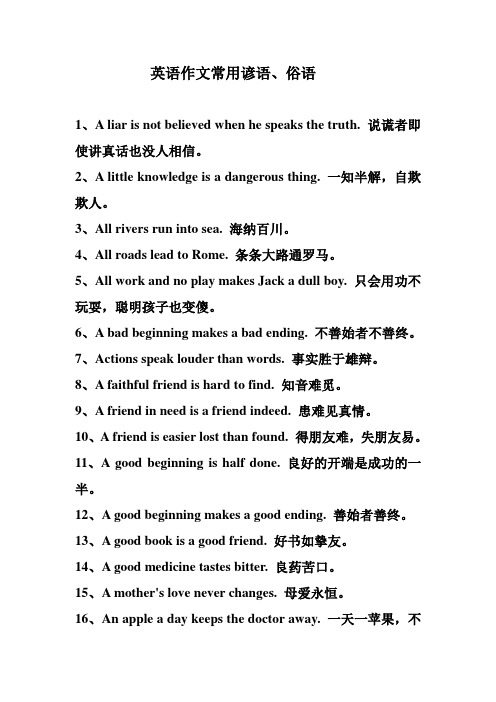
英语作文常用谚语、俗语1、A liar is not believed when he speaks the truth. 说谎者即使讲真话也没人相信。
2、A little knowledge is a dangerous thing. 一知半解,自欺欺人。
3、All rivers run into sea. 海纳百川。
4、All roads lead to Rome. 条条大路通罗马。
5、All work and no play makes Jack a dull boy. 只会用功不玩耍,聪明孩子也变傻。
6、A bad beginning makes a bad ending. 不善始者不善终。
7、Actions speak louder than words. 事实胜于雄辩。
8、A faithful friend is hard to find. 知音难觅。
9、A friend in need is a friend indeed. 患难见真情。
10、A friend is easier lost than found. 得朋友难,失朋友易。
11、A good beginning is half done. 良好的开端是成功的一半。
12、A good beginning makes a good ending. 善始者善终。
13、A good book is a good friend. 好书如挚友。
14、A good medicine tastes bitter. 良药苦口。
15、A mother's love never changes. 母爱永恒。
16、An apple a day keeps the doctor away. 一天一苹果,不用请医生。
17、A single flower does not make a spring. 一花独放不是春,百花齐放春满园。
18、A year's plan starts with spring. 一年之计在于春。
动词八大时态用法以及练习总结精华
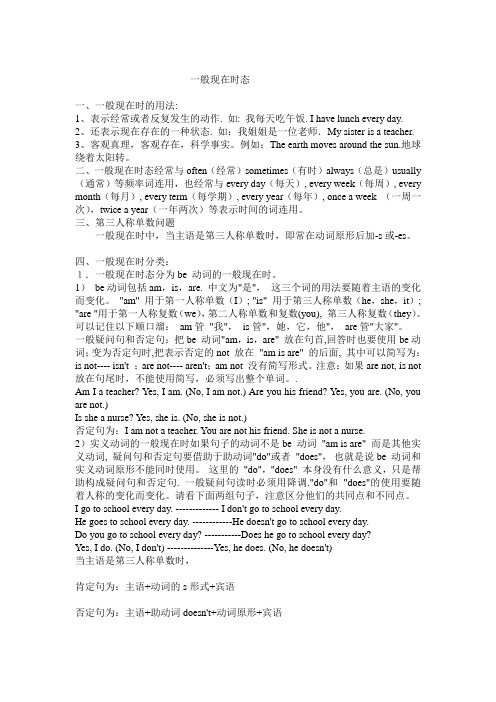
一般现在时态一、一般现在时的用法:1、表示经常或者反复发生的动作. 如: 我每天吃午饭. I have lunch every day.2、还表示现在存在的一种状态. 如:我姐姐是一位老师.My sister is a teacher.3、客观真理,客观存在,科学事实。
例如:The earth moves around the sun.地球绕着太阳转。
二、一般现在时态经常与often(经常)sometimes(有时)always(总是)usually (通常)等频率词连用,也经常与every day(每天), every week(每周), every month(每月), every term(每学期), every year(每年), once a week (一周一次),twice a year(一年两次)等表示时间的词连用。
三、第三人称单数问题一般现在时中,当主语是第三人称单数时,即常在动词原形后加-s或-es。
四、一般现在时分类:1.一般现在时态分为be 动词的一般现在时。
1)be动词包括am,is,are. 中文为"是",这三个词的用法要随着主语的变化而变化。
"am" 用于第一人称单数(I); "is" 用于第三人称单数(he,she,it); "are "用于第一人称复数(we),第二人称单数和复数(you), 第三人称复数(they)。
可以记住以下顺口溜:am管"我",is管",她,它,他",are管"大家"。
一般疑问句和否定句:把be 动词"am,is,are" 放在句首,回答时也要使用be动词;变为否定句时,把表示否定的not 放在"am is are" 的后面, 其中可以简写为:is not---- isn't ;are not---- aren't;am not 没有简写形式。
初中英语知识归纳总结——动词的时态

初中英语知识归纳总结——动词的时态动词的时态(一)教学重点一般现在时在英语中,不同时间里以不同方式发生的动作或存在的状态,要用不同的动词形式来表示,动词的这种不同形式称为动词的时态。
时态从时间上划分,可分为四大类:现在时;过去时;将来时;过去将来时。
从行为上,每一类可以分为四种形式:一般式;进行式;完成式;完成进行式。
这样英语的动词合起来,总共有十六种时态,初中只需掌握其中的八种时态。
1、一般现在时(1)一般现在时表示现在的状态、习惯性的动作或主语所具备的性格和能力等。
①当动词是be时,第一人称用am,第二人称用is,其他人称用are.②当动词是实义动词时,一般用动词原形,但如果主语是第三人称单数时,动词必须用第三人称单数形式,其变化规则如下:助动词do(第三人称单数用does)构成否定句、疑问句及答语,但要注意助动词后原来的谓语动词要恢复原形。
例如:I like music.I don’t like music.Do you like music?Yes, I do No, I don’t(2)一般现在时的用法①表示经常、习惯性动作,常和often, usually, every day, sometimes, always 等时间状语连用。
如:He goes to school by bus every day.They often play football②表示能力、职业、特征。
如:Miss Gao teaches English.Do you speak Japanese?③表示客观存在。
如:The earth moves round the sun.Time and tide wait for no man.④表示已经安排好或计划好的事。
如The plane takes off at 7:30.Classes begin at 8:00⑤在时间状语和条件状语从句中,主句用一般将来时,从句用一般现在时。
初中英语语法-八种时态详解与练习
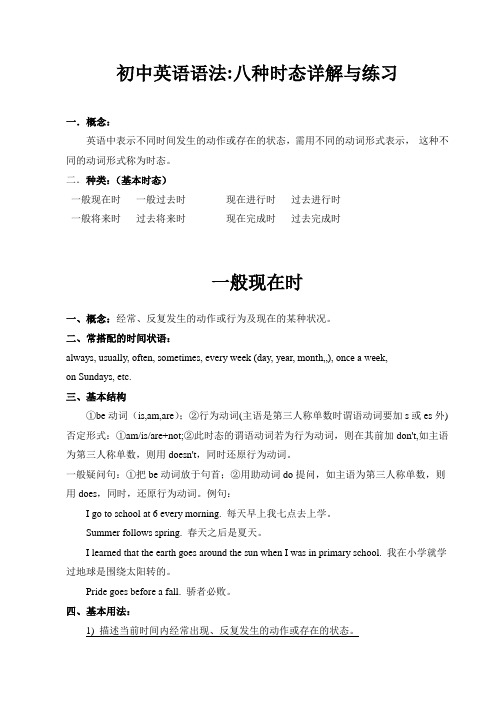
初中英语语法:八种时态详解与练习一.概念:英语中表示不同时间发生的动作或存在的状态,需用不同的动词形式表示,这种不同的动词形式称为时态。
二.种类:(基本时态)一般现在时一般过去时现在进行时过去进行时一般将来时过去将来时现在完成时过去完成时一般现在时一、概念:经常、反复发生的动作或行为及现在的某种状况。
二、常搭配的时间状语:always, usually, often, sometimes, every week (day, year, month…), once a week,on Sundays, etc.三、基本结构①be动词(is,am,are);②行为动词(主语是第三人称单数时谓语动词要加s或es外) 否定形式:①am/is/are+not;②此时态的谓语动词若为行为动词,则在其前加don't,如主语为第三人称单数,则用doesn't,同时还原行为动词。
一般疑问句:①把be动词放于句首;②用助动词do提问,如主语为第三人称单数,则用does,同时,还原行为动词。
例句:I go to school at 6 every morning. 每天早上我七点去上学。
Summer follows spring. 春天之后是夏天。
I learned that the earth goes around the sun when I was in primary school. 我在小学就学过地球是围绕太阳转的。
Pride goes before a fall. 骄者必败。
四、基本用法:1) 描述当前时间内经常出现、反复发生的动作或存在的状态。
在这种情景中,句子常带有表示频率的时间状语:always , everyday , often , once a week (month , year , etc.) , sometimes , seldom , usually等等,以表示句中的动作或状态是习惯性的、经常性的。
初中英语语法知识—动词时态的真题汇编及解析(1)
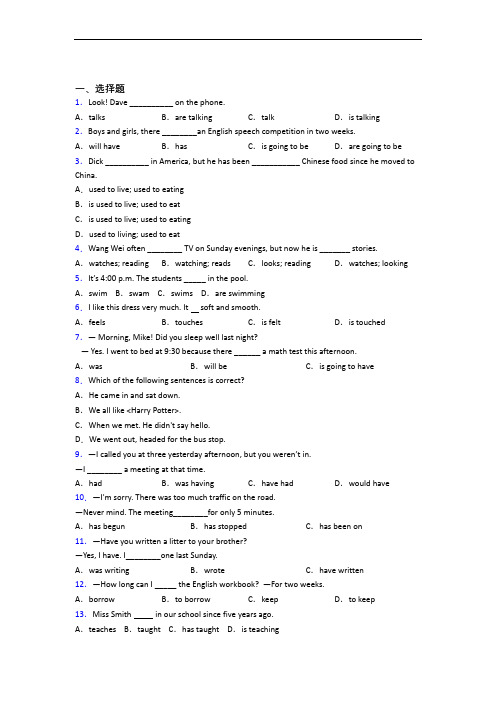
一、选择题1.Look! Dave __________ on the phone.A.talks B.are talking C.talk D.is talking 2.Boys and girls, there ________an English speech competition in two weeks.A.will have B.has C.is going to be D.are going to be 3.Dick __________ in America, but he has been ___________ Chinese food since he moved to China.A.used to live; used to eatingB.is used to live; used to eatC.is used to live; used to eatingD.used to living; used to eat4.Wang Wei often ________ TV on Sunday evenings, but now he is _______ stories. A.watches; reading B.watching; reads C.looks; reading D.watches; looking 5.It’s 4:00 p.m. The students _____ in the pool.A.swim B.swam C.swims D.are swimming6.I like this dress very much. It soft and smooth.A.feels B.touches C.is felt D.is touched 7.— Morning, Mike! Did you sleep well last night?— Yes. I went to bed at 9:30 because there ______ a math test this afternoon.A.was B.will be C.is going to have 8.Which of the following sentences is correct?A.He came in and sat down.B.We all like <Harry Potter>.C.When we met. He didn't say hello.D.We went out, headed for the bus stop.9.—I called you at three yesterday afternoon, but you weren’t in.—I ________ a meeting at that time.A.had B.was having C.have had D.would have 10.—I'm sorry. There was too much traffic on the road.—Never mind. The meeting________for only 5 minutes.A.has begun B.has stopped C.has been on 11.—Have you written a litter to your brother?—Yes, I have. I________one last Sunday.A.was writing B.wrote C.have written 12.—How long can I _____ the English workbook? —For two weeks.A.borrow B.to borrow C.keep D.to keep 13.Miss Smith in our school since five years ago.A.teaches B.taught C.has taught D.is teaching14.When I was young, my mother ___________ by my side all the time.A.stays B.is staying C.stayed D.will stay 15.—Remember the first time we met, Jim?—Of course I do. You ________ in the library.A.were reading B.have read C.will read D.read 16.Look at Amy. She ________ for the school bus.A.wait B.is waiting C.waits D.waiting 17.The water ______ cool when I jumped into the pool for morning exercise.A.was felt B.is felt C.felt D.feels 18.While I_______ a detective story, someone_______ at the door.A.read, was knockingB.read, knockedC.was reading, knockedD.was reading, was knocking19.---Where have you been recently?---I _______ in Hangzhou on business for a week last month.A.have been B.had gone C.had been D.was 20.It’s 8 o’clock. The students _________ an English class.A.have B.having C.is having D.are having 21.With a book in his hand, the boy ________ in bed.A.lie B.lied C.lay D.lying 22.Don’t talk! The baby ________.A.sleeps B.is sleep C.sleeping D.is sleeping 23.— What do you use MP3 for?— I ________ it ________ to music.A.use; listen B.are listening; listeningC.use; to listen D.is listening; to listening24.My father is a teacher and he ___________ in this school for about twenty years. A.works B.is working C.was working D.has worked 25.—How much is the ticket (票) to Central Park?—One ticket $40, and you can $80 for two persons.A.costs; pay B.cost; spend C.pay; spend D.spends; pay 【参考答案】***试卷处理标记,请不要删除一、选择题1.D【解析】【分析】【详解】句意:看!Dave正在打电话。
初中英语语法八大时态总结及练习题
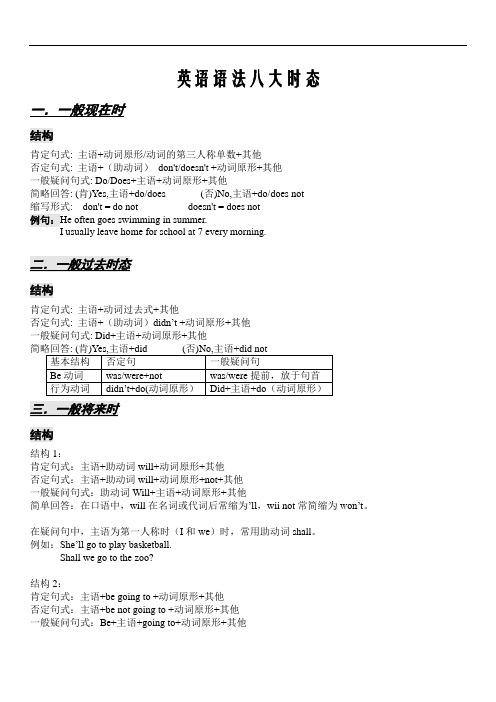
英语语法八大时态一.一般现在时结构肯定句式: 主语+动词原形/动词的第三人称单数+其他否定句式: 主语+(助动词)don't/doesn't +动词原形+其他一般疑问句式: Do/Does+主语+动词原形+其他简略回答: (肯)Yes,主语+do/does (否)No,主语+do/does not缩写形式: don't = do not doesn't = does not例句:He often goes swimming in summer.I usually leave home for school at 7 every morning.二.一般过去时态结构肯定句式: 主语+动词过去式+其他否定句式: 主语+(助动词)didn’t +动词原形+其他一般疑问句式: Did+主语+动词原形+其他基本结构否定句一般疑问句Be动词was/were+not was/were提前,放于句首行为动词didn’t+do(动词原形)Did+主语+do(动词原形)三.一般将来时结构结构1:肯定句式:主语+助动词will+动词原形+其他否定句式:主语+助动词will+动词原形+not+其他一般疑问句式:助动词Will+主语+动词原形+其他简单回答:在口语中,will在名词或代词后常缩为’ll,wii not常简缩为won’t。
在疑问句中,主语为第一人称时(I和we)时,常用助动词shall。
例如:She’ll go to play basketball.Shall we go to the zoo?结构2:肯定句式:主语+be going to +动词原形+其他否定句式:主语+be not going to +动词原形+其他一般疑问句式:Be+主语+going to+动词原形+其他简略回答:(肯)Yes,主语+be (否)No,主语+be not将来时其他表示法1)be going to表示将来表示说话人的打算、计划、安排或根据迹象判断必然或很可能发生的事情。
初中动词时态知识点总结
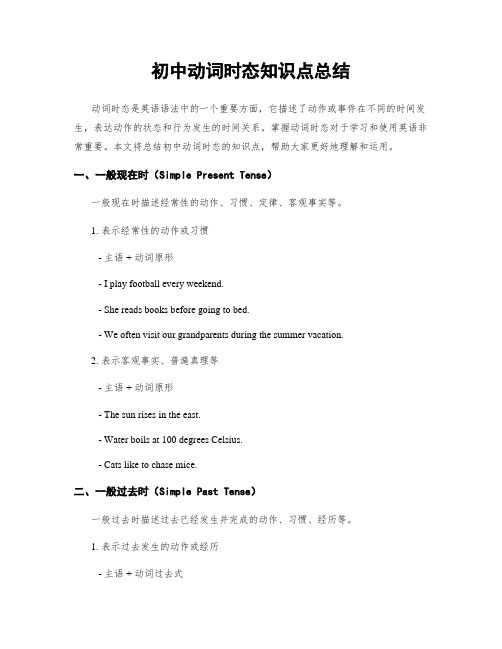
初中动词时态知识点总结动词时态是英语语法中的一个重要方面,它描述了动作或事件在不同的时间发生,表达动作的状态和行为发生的时间关系。
掌握动词时态对于学习和使用英语非常重要。
本文将总结初中动词时态的知识点,帮助大家更好地理解和运用。
一、一般现在时(Simple Present Tense)一般现在时描述经常性的动作、习惯、定律、客观事实等。
1. 表示经常性的动作或习惯- 主语 + 动词原形- I play football every weekend.- She reads books before going to bed.- We often visit our grandparents during the summer vacation.2. 表示客观事实、普遍真理等- 主语 + 动词原形- The sun rises in the east.- Water boils at 100 degrees Celsius.- Cats like to chase mice.二、一般过去时(Simple Past Tense)一般过去时描述过去已经发生并完成的动作、习惯、经历等。
1. 表示过去发生的动作或经历- 主语 + 动词过去式- I watched a movie last night.- She visited her friend yesterday.- We lived in London for five years.2. 表示过去的习惯- 主语 + used to + 动词原形- I used to go swimming every summer.- He used to play basketball when he was young.三、一般将来时(Simple Future Tense)一般将来时描述将来会发生的动作、计划、打算等。
1. 表示将来会发生的动作或计划- 主语 + will + 动词原形- I will visit my grandparents next week.- She will study abroad after finishing high school.- They will have a party for their anniversary.2. 表示意愿、决定和承诺- 主语 + be going to + 动词原形- I am going to start a new job next month.- He is going to learn how to play the guitar.- We are going to travel around the world in the future.四、现在进行时(Present Continuous Tense)现在进行时描述正在进行的动作、当前的情况和变化等。
初中英语语法:动词时态讲解及练习
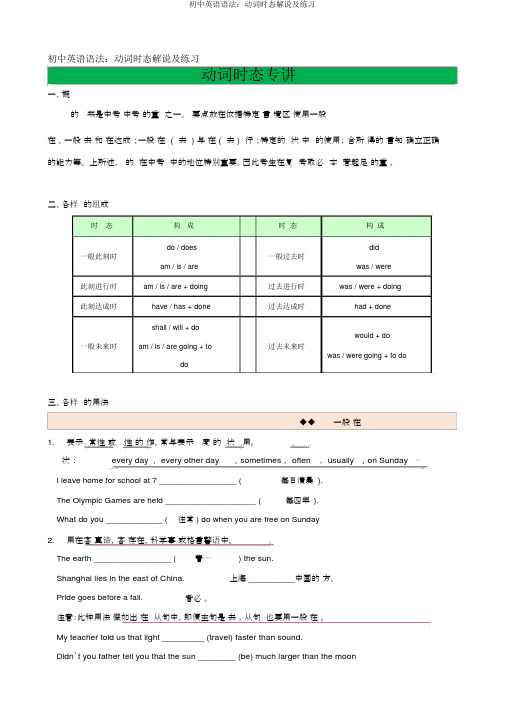
初中英语语法:动词时态解说及练习动词时态专讲一、概的来是中考中考的重之一。
要点放在依据特定言境区使用一般在,一般去和在达成;一般在 ( 去 ) 与在 ( 去 ) 行;特定的状中的使用;合所得的言知确立正确的能力等。
上所述,的在中考中的地位特别重要。
因此考生在复考取必本惹起足的重。
二、各样的组成时态构成时态构成do / does did一般此刻时am / is / are 一般过去时was / were此刻进行时am / is / are + doing过去进行时was / were + doing此刻达成时have / has + done过去达成时had + doneshall / will + dowould + do 一般未来时am / is / are going + to过去未来时was / were going + to dodo三、各样的用法◆◆一般在1.表示常性或性的作,常与表示度的状用。
状:every day , every other day,sometimes,often, usually,on Sunday⋯I leave home for school at 7 _________________ (每日清晨).The Olympic Games are held ____________________ (每四年).What do you ____________ (往常 ) do when you are free on Sunday2.用在客真谛,客存在,科学事或格言警语中。
The earth _________________ (着⋯⋯) the sun.Shanghai lies in the east of China.上海 __________中国的方。
Pride goes before a fall.者必。
注意:此种用法假如出在从句中,即便主句是去,从句也要用一般在。
- 1、下载文档前请自行甄别文档内容的完整性,平台不提供额外的编辑、内容补充、找答案等附加服务。
- 2、"仅部分预览"的文档,不可在线预览部分如存在完整性等问题,可反馈申请退款(可完整预览的文档不适用该条件!)。
- 3、如文档侵犯您的权益,请联系客服反馈,我们会尽快为您处理(人工客服工作时间:9:00-18:30)。
一、选择题1.— How ________ your trip to Australia?—Great. I’ll go there again next year.A.was B.is C.are D.were2.My grandfather ________ live in the countryside, but now he ________ living in the city. A.used to; used to B.was used to; gets used toC.used to; is used to D.was used to; used to3.Will you go fishing if it ________ tomorrow?A.didn’t rain B.doesn’t rain C.won’t rain 4.—Listen!Who in the music room?—It must be Sally. She there every day.A.sings, sings B.is singing, sings C.sings, is singing 5.—Rose, can you give me a hand?—Just a minute. I ______ the followers.A.am watering B.have wateredC.watered D.water6.We’re not sure _______ there’ll be _______ or not tomorrow.A.if; rains B.if; rainy C.whether; raining D.whether; rain 7.Boys and girls, there ________an English speech competition in two weeks.A.will have B.has C.is going to be D.are going to be 8.My mother _____ dinner when I got home yesterday.A.has cooked B.was cooking C.will cook D.cooks9.I like this dress very much. It soft and smooth.A.feels B.touches C.is felt D.is touched 10.— Morning, Mike! Did you sleep well last night?— Yes. I went to bed at 9:30 because there ______ a math test this afternoon.A.was B.will be C.is going to have 11.Which of the following sentences is correct?A.He came in and sat down.B.We all like <Harry Potter>.C.When we met. He didn't say hello.D.We went out, headed for the bus stop.12.—How long have you________?—For 10 years, we got married in 2005.A.married B.got married C.been married D.were married 13.Nick's brother________the navy in 2011and ________the navy since then. A.joined; has joined B.joined in; has joined inC.joined in; has been in D.joined; has been in14.----Can you tell me how long you_______ the Huawei mobile phone,Mr. Zhang.----Nearly a year. It works very well.A.will buy B.have had C.have bought D.had had15.The water ______ cool when I jumped into the pool for morning exercise. A.was felt B.is felt C.felt D.feels 16.While I_______ a detective story, someone_______ at the door.A.read, was knockingB.read, knockedC.was reading, knockedD.was reading, was knocking17.---Where have you been recently?---I _______ in Hangzhou on business for a week last month.A.have been B.had gone C.had been D.was 18.It’s 8 o’clock. The students _________ an English class.A.have B.having C.is having D.are having 19.Can you describe ________?A.what the student look like B.what does the student look like C.what does the student looks like D.what the student looks like 20.—How did the accident happen?—You know, it was difficult to see the road clearly because it________.A.was raining B.has rained C.is raining D.will rain 21.Could you please turn down your music? I________.A.work B.works C.am working D.worked 22.— What do you use MP3 for?— I ________ it ________ to music.A.use; listen B.are listening; listeningC.use; to listen D.is listening; to listening23.It often __________ in the north of China in winter, and the weather is very cold. A.snowing B.snows C.snowy24.My father is a teacher and he ___________ in this school for about twenty years. A.works B.is working C.was working D.has worked 25.—Have you written a litter to your brother?—Yes, I have. I________one last Sunday.A.was writing B.wrote C.have written【参考答案】***试卷处理标记,请不要删除一、选择题1.A解析:A【解析】【分析】【详解】句意:——你的澳大利亚之旅怎么样?——非常好。
明年我还要去那儿。
考查一般过去时和be动词。
根据句意可知,此处应使用一般过去时,排除B和C;又因为本句的主语是your trip表单数。
故选A。
2.C解析:C【解析】【分析】【详解】句意:我祖父过去住在农村,但现在他习惯于住在城市。
考查used短语辨析。
短语used to do sth.表示“过去常常做某事”;be /get used to doing sth.表示“习惯做某事”;第一空是过去住在乡下,用used to do的形式;排除BD;第二空表示习惯做某事,用be used to doing,排除A。
根据题意,故选C。
3.B解析:B【解析】【分析】【详解】句意:如果明天不下雨,你会去钓鱼吗?考查if引导的条件状语从句的“主将从现”。
didn’t rain一般过去时;doesn’t rain一般现在时;won’t rain一般将来时。
分析句子可知,此处是if引导的条件状语从句,需满足“主将从现”,从句应使用一般现在时。
故选B。
4.B解析:B【解析】【分析】【详解】句意:——听!谁在音乐室唱歌?——一定是莎莉。
她每天都在那里唱歌。
考查时态。
sings唱歌,动词三单;is singing正在唱歌,现在进行时;根据句意理解可知,第一空前面是listen,说明这个动作正在进行,所以用现在进行时,而第二空时间是every day,是一般现在时的标志词,所以要用一般现在时,而句子主语是she,所以动词三单,故选B。
【点睛】英语中不同的时态有不同的标志词,做题时要注意。
根据不同的标志词来判断用什么时态,比如本题中listen,就是现在进行时的标志词,类似的还有look,以后做题看到这两个词放在句首,并且用标点符号隔开时,就确定句子要用现在进行时。
5.A解析:A【解析】【分析】【详解】句意:——Rose,你能帮我一下吗?——等一下,我正在浇花。
考查现在进行时。
根据语境:“Rose,你能帮我一下吗?”“等一下,我______花。
”可推测是正在浇花,所以用现在进行时。
故答案为A。
6.D解析:D【解析】句意:我们不确定明天是否会下雨。
考查连词辨析和动词时态辨析。
if和whether表示“是否”可换用,但和or not连用时需用whether,可排除AB两项。
tomorrow用于一般将来时,be raining是进行时结构,可排除。
根据句意结构,可知选D。
7.C解析:C【解析】【分析】【详解】句意:同学们,两周后将有一场英语演讲比赛。
考查动词时态,根据“in two weeks两周后”可知应该用一般将来时,排除C;观察句型,这里用的是there be句型,选项A错误;又因为这里是“an English speech competition一场英语演讲比赛”那么应该用is,故选C。
